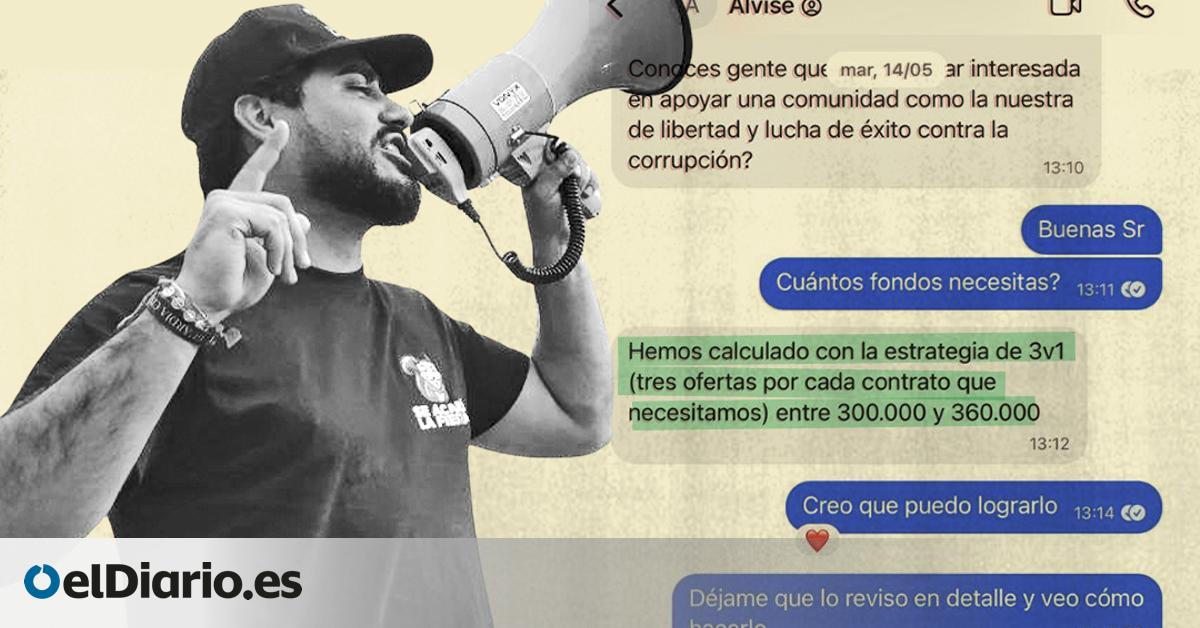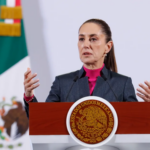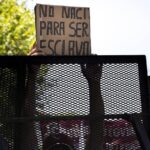
Alvise Pérez took to the road on May 28 to promote his candidacy for the European elections. He travelled all over the country until he culminated his campaign, austere and based on word of mouth, in a multitudinous event in the Plaza de Colón in Madrid. One day before starting his tour, the current MEP received 100,000 euros in cash, as confirmed by the businessman who provided it and confirmed by the messages he has made available to the Justice. Now the Prosecutor’s Office is studying whether there was illegal financing of the Se Acabó la Fiesta (SALF) campaign and has in its hands the answer to the key question: how is Alvise financed?
Alvise worked for a time under the orders of Ciudadanos and Toni Cantó in the Valencian Community until he left politics and focused on his Telegram channel, where today he has more than 710,000 followers. People who, day after day, consume messages with hoaxes, racism, sexism, as well as his political slogans. And who also respond to the requests of the far-right agitator to receive money and be able to finance his “fight”.
To date, Alvise has never explained how he makes a living, mixing explanations about his own money with these supposed donations. Nor has he explained with what money he has paid for some of his actions on the street, such as the bus shelters he used to carry out a false experiment against the Government or the various giant banners he has hung from buildings over the years. Nor has he explained with what income he pays for his multiple legal disputes, some of which have already concluded with firm sentences against him.
This enigma was carried over into his electoral campaign for the European elections: a campaign that, as he repeatedly said, was based on “word of mouth” with small events in squares with hardly any logistics, armed with a megaphone and printed ballots. At his final campaign launch in Madrid’s Plaza de Colón, he was accompanied by security personnel and displayed several banners. But the staging was far from the large events of PSOE, PP and Vox in places like Fuenlabrada or Valencia.

His economic strategy, for years, has been based on asking for money through his Telegram channel in order to finance himself without the supposed risk of banks blocking his income. But he has never said how much money he has or what he does with the donations from his followers.
The messages revealed by elDiario.es put some numbers on the table: a few days before starting his electoral campaign in 16 Spanish cities, he obtained 7,000 euros in donations through various cryptocurrency wallets and also received 100,000 euros in cash from Álvaro Romillo, a businessman who used the pseudonym Luis ‘Cryptospain’ on social networks and who is known for his positions against the “thieving State” and in favor of tax avoidance. His business collapsed on September 16 after he was unable to meet the high returns (between 30 and 53%) that he promised his investors.

Alvise Pérez estimates that he needs 300,000 euros to finance his campaign.
For months, a kind of almost commercial relationship was forged between the two, in which the candidate sought money to finance himself and the businessman to have access to his community to advertise his businesses. “Your speech is absolutely identical to mine against the State, and that is why I want to support you,” Alvise told him, asking him if he knew anyone who might be interested in supporting his community, which he defined as “one of freedom and a successful fight against corruption.”
The businessman replied that he knew “people who have money” and who might be interested not so much in his political project, but in making contributions as a kind of “investment” or “collaboration” in exchange for him advertising their businesses among his followers. Alvise said he was “delighted” to do some “weekly promotion” or “record very viral things with guests and influencers,” although the messages provided to the Prosecutor’s Office do not include the exact terms of this alleged collaboration.
In the weeks before receiving the 100,000 euros in hand, the now MEP explained to the businessman that he needed at least 300,000 euros to boost his career towards Brussels, according to the messages that both exchanged. According to his story, he had already put 100,000 euros out of his own pocket and the 7,000 he had received in donations were insufficient. He even explained his “needs” in response to the businessman’s request for clarification. Above all, one stands out: “Funds that do not need to be controlled by the Court of Auditors” to pay for rallies, advertising and campaign events. The rallies and political events were only the first part of the equation, but he also needed funds to face, in his own words, “certain fines for revealing secrets against the State and Data Protection”.

Alvise Pérez explains that he needs money to finance his “political adventure.”
The documentation in the hands of the Supreme Court Prosecutor’s Office, the only one competent to investigate him given his status as a privileged person, indicates that Alvise achieved his double objective: to obtain funds and to do so, moreover, in the opaque manner that was requested. The businessman himself had conveyed to him in another message that “the most interesting thing” would be to do it in cash. “If we link a transfer from a company to your bank account, then we are going to put it in the spotlight because you are going to be absolutely in the spotlight. And that is surely not in our interest.” “In cash it is untraceable, yes. Ok.”, Alvise replies to the donor, who almost four months later has decided to tell everything to the Prosecutor’s Office.
At four o’clock in the afternoon on May 27, in the middle of the campaign, the businessman summoned the then candidate to the most exclusive neighborhood in Madrid to give him the 100,000 euros. Specifically, in the offices of his company Sentinel, a firm dedicated to facilitating money exchanges under a promise of total confidentiality that manages 5,000 safe deposit boxes in an armored fortification in the heart of the capital. All behind the back of the Treasury and circumventing the anti-fraud measures that financial institutions are obliged to follow.
Those 100,000 euros, Alvise said at the time, would allow him to launch “an urgent part of the campaign,” according to a message he wrote to his financier when the latter told him that he had been “reviewing” and that he already had those funds at his disposal. The delivery, which was carried out by an employee of Romillo, was carried out successfully. “They have already told me that everything is ok,” wrote the businessman. “Everything is ok! 100,000 thanks, Luis,” replied Alvise, according to the list of messages provided to the Prosecutor’s Office.

The day after collecting the money, the far-right activist began a tour that started in Valladolid and ended in Madrid after passing through cities such as Barcelona, Valencia, Malaga and Bilbao. It was a campaign characterised by the austerity that Alvise himself boasted about: a cap, a megaphone and ballots printed by himself to prevent an alleged electoral fraud that never occurred.
Money and financing did not come up again between the two in the following weeks. However, in their previous conversations Alvise had explained to the businessman that his aim was to obtain funds that did not have to go through the Court of Auditors and avoid the limits imposed by the rules on financing political parties.
Now the Supreme Court Prosecutor’s Office has to decide whether to open a case to investigate, precisely, whether he used 100,000 euros in cash from a cryptocurrency investment club to, as he said in his messages, finance his political “adventure” or even pay his fines and pending cases with the Justice. Meanwhile, some of those affected by the closure of Madeira Invest Club who have filed complaints in the National Court against its founder, Álvaro Romillo, also point to Alvise, who they ask to be charged. Only the Supreme Court is competent to do so.
The law on political party financing prohibits anonymous donations and establishes that political parties cannot accept or receive, directly or indirectly, donations from the same person exceeding 50,000 euros per year, nor donations from legal entities. In addition, all donations exceeding 25,000 euros must be notified to the Court of Auditors by the political party within three months of their acceptance.
More from the investigation by elDiario.es
– Alvise Pérez received 100,000 euros in cash from a cryptocurrency businessman during the campaign
– AUDIOS | Alvise promised laws in favor of the businessman who paid him 100,000 euros: “I will be the key to the government with Feijóo and Abascal”
– Alvise’s messages after receiving the cash: “Thank you 100,000”
Source: www.eldiario.es

